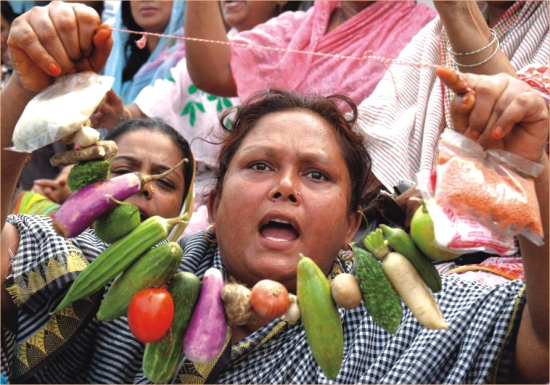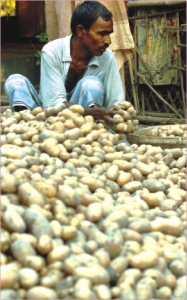
Inside
|
My bread costs more Are sky-rocketing prices likely to negatively effect the government's election fortunes, questions Inam Ahmed
Dhakaites woke up to a curious sight on a September morning this year. Under the watchful eyes of the Bangladesh Rifles (BDR) personnel, best known for guarding the borders, vendors were selling meat and vegetables in city markets. A few days later, Saifur Rahman, the finance minister, appeared on camera and told reporters that the falling dollar value bodes well for the people, as imports get cheaper and consumer prices fall -- a stark deviation from his earlier pro-export bias. But in the context of a looming general election, one might find some answers for such actions. With prices spiraling to new heights every month, as it seems from media reports, the ruling alliance, especially the BNP, is fidgety about the possible outcome. BNP grassroots workers have openly told the high-ups at a series of consultation meetings that unless galloping prices of essentials are arrested quickly, the consequences may be dire for the party. For the party or not, consequences are already dire for the people, with inflation, as measured by the consumer price index (CPI), hitting 7.16 percent in June, the highest in eight years. But these figures are reviled on the streets, because by the general people's estimate, the cost of living has gone up far more. Many would say it has doubled, or even tripled, in a span of a year or so, as measured by the prices of potato, sugar, and cooking oil, or according to the yardstick of rising fuel prices and transport fares. Fuel prices have increased nine times over the last five years of the incumbent government, the latest in June this year being the biggest jump of up to 30 percent. The government's reactions before and after every price hike make it obvious that increasing fuel price is deemed to be another politically sensitive area, although there was hardly any alternative, with an ever increasing loss liability of the Bangladesh Petroleum Corporation (BPC), which ran Tk 3,704 crore into the red last fiscal year.
Whatever reasons people quote for their falling living standards, it all yields the same conclusion -- people have to fork out more and more money everyday for the same things they consumed. And they don't like it at all. After all, wages only increased by 18.06 percent (in real terms) in five years, at an average of 3.75 percent a year. Despite the fact that people are smarting under price pressure, the question now is: will the alliance, or, to be more precise, the BNP, suffer because of the public discontent over inflation, and if so, to what extent? Inflation, unlike many other economic indicators, after all, affects the people directly. Yet a clear answer may not be readily available due to the voting tendency in Bangladesh and the sharp partisan nature of the polity. In the last parliamentary election of 2001, the general perception about the immediate past Awami League rule was quite negative, mainly on account of rising crime, corruption, and the party's acting in an overbearing manner, leading to the anticipation that the AL would suffer, although inflation was quite low during its rule (in 2001, inflation rate was 1.94 percent). It did suffer in terms of seats, going from 147 in 1996 to only 62 in 2001. But then, to the surprise of many, it was found that the AL had gained in terms of the popular vote, from 37.44 percent in 1996, the year it came to power, to 40.14 percent. BNP's votes also increased in a similar fashion from 33.61 percent in 1996 to 40.86 percent in 2001, so both parties increased their votes by roughly 4 percentage points. This also probably showed one thing that was difficult to ascertain before -- the swing vote in a country of sharply divided polity is about 8 percent. And these swing voters are the most likely to be influenced by As one analyst (Nazim Kamran Choudhury in The Daily Star) had pointed out, a 4-5 percent vote swing can mean 30 seats for a party in the 90-seat Dhaka division alone. So, when the swing vote is 8 percentage points, it must be a big worry for the alliance that prices of essentials are spiraling out of control. But will it really matter this time in deciding the BNP's fate? In 2001, after all, more voters voted for the incumbent AL than in the previous election, despite the poor AL record. If these swing voters are mainly young voters, they would be the least bothered by inflation as they do not go to the markets. And older voters tend to hold on to their party loyalty. Given this characteristic of the voters, why then would any party fret so much over price increases -- the former commerce minister Amir Khasru Mahmud's head rolled when onion prices soared during Ramadan in 2004 and the incumbent commerce minister, Hafizuddin Ahmed, was made to make whirlwind visits to markets -- and grassroots complaints about inflation? Why does the opposition not forget to mention runaway inflation at every public meeting? Perhaps inflation has been so unprecedented and so enfeebling that the opposition hopes to finally be able to turn the frustration of the captive voters against the ruling alliance and break their long-standing party loyalty. Whatever catalytic role inflation may have in influencing election results -- and who has not heard of the modern proverb that elections are not won by oppositions but lost by governments -- the consumers can still hope for a respite in their ever ballooning spending if the government is kept on its toes. Inam Ahmed is News Editor, |

 And every time fuel prices were increased, transportation costs also spiraled. The latest rise, as per reports from the northern district of Natore, has added another Tk 3,000 to the cost of transporting three tons of vegetables to Dhaka, a distance of about 300 km, and the cost has been passed on to the consumers.
And every time fuel prices were increased, transportation costs also spiraled. The latest rise, as per reports from the northern district of Natore, has added another Tk 3,000 to the cost of transporting three tons of vegetables to Dhaka, a distance of about 300 km, and the cost has been passed on to the consumers.  factors such as the cost of living.
factors such as the cost of living.